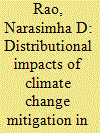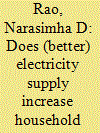| Srl | Item |
| 1 |
ID:
125653


|
|
|
|
|
| Publication |
2013.
|
| Summary/Abstract |
Studies that examine the distributional impacts of climate change mitigation policies often neglect the influence of institutions that implement these policies. This study examines the short-term consumption-side distributional impacts of expanding low-carbon electric supply in the state of Maharashtra, India with a focus on the influence of regulatory discretion in pricing. Households' welfare impacts from economy-wide electricity price shocks are simulated against a baseline that is calibrated to actual household economic and electricity service conditions, including actual electricity budgets, block tier prices and supply rationing. Industrial price impacts are propagated to households using a Leontief input-output analysis. Regulatory pricing decisions are evaluated based on social welfare metrics for economic efficiency and income inequality. The analysis reveals new linkages between climate change mitigation, electricity policy and income distribution. Low-income households can be shielded from mitigation impacts without losses in aggregate welfare to the extent that regulators can recover mitigation costs through industrial price increases. Regulators' flexibility to distribute costs across households is constrained by industrial customers' migration off the grid. Reduced supply interruptions to the rural poor from the resulting demand contraction are a potential co-benefit of mitigation. Distributional impacts, therefore, depend on other electricity policies that are driven by the political economy of the sector.
|
|
|
|
|
|
|
|
|
|
|
|
|
|
|
|
| 2 |
ID:
121388


|
|
|
|
|
| Publication |
2013.
|
| Summary/Abstract |
Electricity access is an important driver of economic development. Previous studies treat electrification as a binary outcome. In reality, in developing countries households with access face chronic supply interruptions, which can last up to 12 h a day. This is the first study to estimate the income differences in urban and rural non-farm enterprises in Indian households with different levels of electricity supply, using a subset of 8125 households in the India Human and Development Survey, a cross-sectional national sample of 41,554 households. I use multiple econometric approaches, including linear regression with an instrument variable and propensity-score matching with multiple treatment levels to represent supply availability. I find a robust income effect of access, and suggestive evidence of the effect of better supply availability. The aggregate income impact across existing NFEs in India of improving supply to 16 h a day could be on the order of 0.1 percent of GDP.
|
|
|
|
|
|
|
|
|
|
|
|
|
|
|
|